Network (1976). One Angry Man.
 Tuesday, April 12, 2011 at 5:31PM
Tuesday, April 12, 2011 at 5:31PM In honor of Sidney Lumet who passed away this weekend, we're re-publishing The Film Experience retrospective on Network from a few years ago. It's new to some of you!
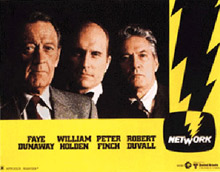
One Angry Man
One thing I suspect about director Sidney Lumet: He liked his drama super-sized, Empire State Building big. No 800 lbs gorillas in the room please, make it King Kong. Give them 16 tons of drama. Lumet wanted grunting, sweating, lunging, screaming, gargantuan desperate drama like the kind you get in Dog Day Afternoon, Before the Devil Knows You’re Dead and Serpico. Never mind 12 Angry Men. How about 1 Angry Man, Sidney Lumet, and in the case of Network -- arguably his best film -- one angry fictional man named Howard Beale (Peter Finch). Network eventually gets around to naming Beale the “mad prophet of the airwaves” but it’s also a self descriptive tag. The movie is mad as hell and prophetic, too. Network is Howard Beale and Howard Beale is Network. This impressively large but also miniature film --it's not hard to imagine it as a stage play -- swings wildly from mood to mood like its bipolar madman.
A lot of movies steal from Network but I love the borrowing that Network does right out of the gate, in omniscient detached voiceover.
In his time Howard Beale had been a mandarin of television. The grand old man of news with a hot rating of 16 and a 28 audience share. In 1969 however his fortunes began to decline. He fell to a 22 share. The following year his wife died and he was left a childless widower with an 8 rating and a 12 share.
We're in the boredom killing business.
That puts us in the shithouse. That's where that puts us.
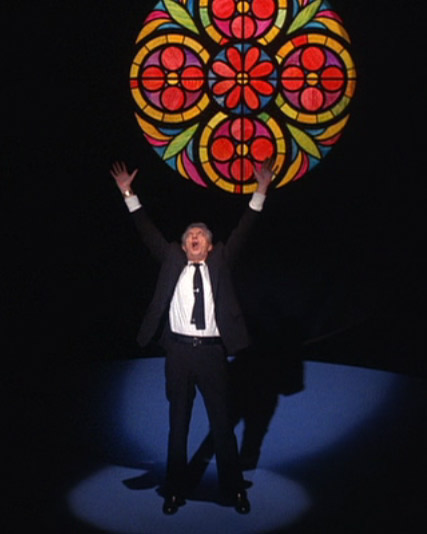 Network is an easy film to quote and its super sculpted and scalding dialogue is undoubtedly the reason why the screenplay (by triple Oscar winner Paddy Chayefsky) is so lauded. It’s the type of talky feature that's jerry-rigged to draw attention to its themes, BIG ideas, diamond hard one liners and showcased monologues. But words aside, the plotting is also tight and strong. I can’t think of a single film that’s more interested in stopping for speeches that also moves with breakneck speed through the twists and turns of its various plots.
Network is an easy film to quote and its super sculpted and scalding dialogue is undoubtedly the reason why the screenplay (by triple Oscar winner Paddy Chayefsky) is so lauded. It’s the type of talky feature that's jerry-rigged to draw attention to its themes, BIG ideas, diamond hard one liners and showcased monologues. But words aside, the plotting is also tight and strong. I can’t think of a single film that’s more interested in stopping for speeches that also moves with breakneck speed through the twists and turns of its various plots.
Plot A: Howard Beale threatens to kill himself on air, leading to rubberneck ratings jumps and corporate exploitation of his sudden insanity. As Beale slips deeper into a complete psychotic break, corporate sharks Diana Christensen (Faye Dunaway) and Frank Hackett (Robert Duvall) start swimming, devouring the smaller fish at the network like Max Schumacher, as they try to capitalize on Beale's popularity with the public who embraces his catchphrase:
I'M AS MAD AS HELL, AND I'M NOT GOING TO TAKE THIS ANYMORE!
Unfortunately Beale's psychosis can't be controlled. When the ratings begin to head south, Diana and Frank coolly take inventory and do as their programming demands. One must respect Sidney Lumet forever for shooting this final deadly meeting in detached almost shudder inducing long shot -- their inhuman words are given all the power. Where are the directors today who know that not every scene should rely on close-ups?
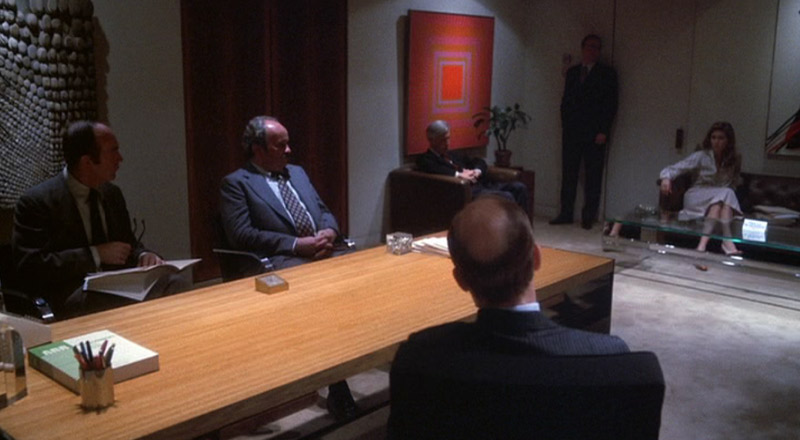
All of a sudden it's closer to the end than the beginning, and death is suddenly a perceptible thing to me, with definable features.
Plot C: Diana, a self described "racist lackey of the imperialist ruling circles", searching for a hit show is inspired by live crime footage she sees. She enters into a business relationship with Laureen Hobbs, a self described "badass commie nigger" and The Ecunemical Liberation Army. They create a show around live footage of acts of political terrorism (Network was doing a vicious satire of reality TV before we even had a name for it). Plot C will collide with Plot A.
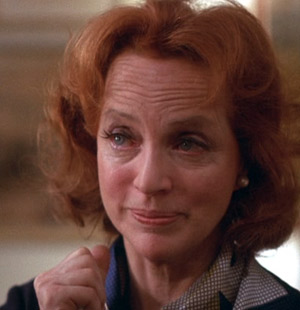 This is not to say that Network doesn't contain amazing performances. Lumet has clearly directed the entire ensemble to go BIG and they do, often with a clear understanding of how to expand without crowding out other players or the movie. Take Beatrice Straight as Max's wife Louise, for a perfect example. The movie has barely any time for her but she seizes her only true scene in a death grip, cramming huge emotional shifts and marital history into an instant polaroid of the abandoned wife.
This is not to say that Network doesn't contain amazing performances. Lumet has clearly directed the entire ensemble to go BIG and they do, often with a clear understanding of how to expand without crowding out other players or the movie. Take Beatrice Straight as Max's wife Louise, for a perfect example. The movie has barely any time for her but she seizes her only true scene in a death grip, cramming huge emotional shifts and marital history into an instant polaroid of the abandoned wife.Another stunner is Ned Beatty as Arthur Jensen who goes even bigger and more theatrical in a role that's all theme embodiment and zero character. You can't judge it in the same way you would a true character role, but his "vast holding company" lunacy feels both inspired and possibly unreal, as if it's been imagined. That's a wise choice for the film. Jensen's unrepentantly theatrical monologue plays as something that might only have been hallucinated, or at least exaggerated, by the mad prophet Beale.You're in for some dreadful grief, Max.
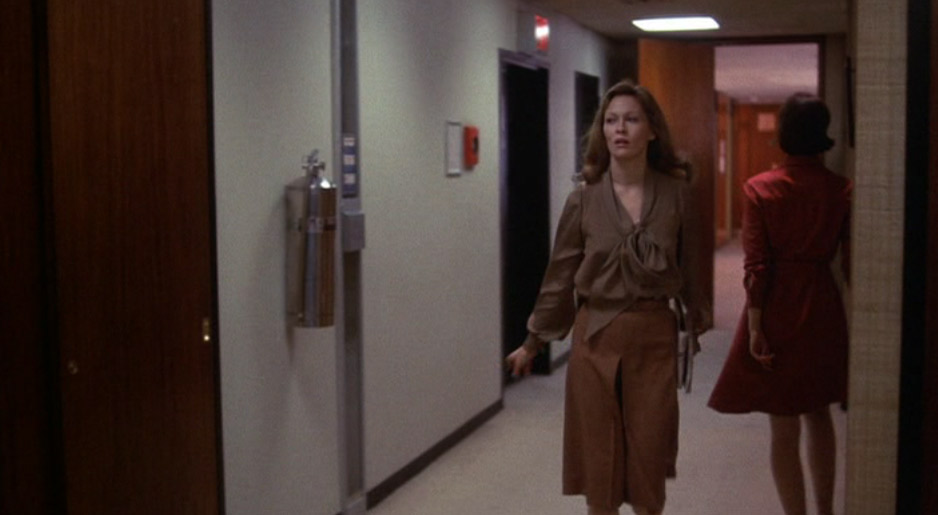
All I know is, you've got to get mad. You've got to say, "I'm a human being, goddamn it. My life has value."
For all of Network big ideas: DEATH, LOVE, CAPITALISM, ENTERTAINMENT, THE CORPORATE VS. THE INDIVIDUAL (capitals intended; the film certainly uses them) and the walking and talking humanoids who spout them, it magically remains human. It gasps, sputters, shivers and rages against the machine.

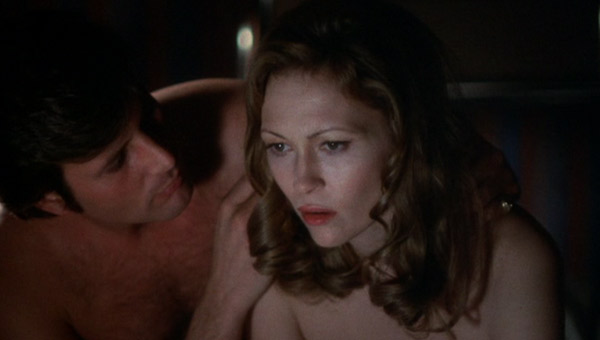
Notes: Network is part of Nathaniel's Personal Canon and a member of the United States National Film Registry for "culturally, historically, or aesthetically significant" movies. It also ranks on the AFI's list of Top 100 Greatest American Films. It was nominated for 10 Academy Awards for the 1976 film year and won four: Best Actor (Peter Finche), Best Actress (Faye Dunaway), Best Supporting Actress (Beatrice Straight) and Best Screenplay (Paddy Chayefsky). It lost the Best Picture prize to Rocky. It's only Best Picture prize was from the Los Angeles Film Critics Association where it tied with Rocky. Sidney Lumet, a five time Oscar nominee, was given an honorary Oscar in 2005 but never won competitively. Lumet RIP.



Reader Comments (11)
I still can't get over the absurd number of accurate predictions that the film made about television and the news. In a way, Network is even funnier - and somewhat scarier - than when it first released, because my generation can see how prophetic it truly is. The parallels between Howard Beale and Glenn Beck alone still floor me.
I have actually recenty seen Network and I was impressed by it. Had no idea that Beatrice Straight won an oscar for this, she really isn't on screen for long. Howard Beale reminded me a little of Charlie Sheen, everybody around encourages him to continue doing what he does because they can benefit from him and of course it will end badly for him.
Little Nitpick, Beale's catchphrase is actually 'I'M MAD AS HELL, AND I'M NOT GOING TO TAKE THIS ANYMORE!' Not sure if this grammatical error was made on purpose or if it was accidental. But Howard Beale repeatedly says the only truth the people know is what they hear on TV and that they should form their own opinions, yet when encouraged to scream this phrase out of their windows, everybody does as told without noticing the grammatical error.
Network blew my mind the first time I saw it...
To think that Taxi Driver was also in competition that year makes me wish the 70s movies were back! I love to be shaken up by powerful stories.
I'll take Laureen Hobbs -- she cracks me the hell up in this movie!
Dunaway is fantastic in this role. In a way, I'm glad they waited to give her the Oscar for this picture, because few films utilize an actress's talent so well while also being an ensemble film. Love what you wrote about her walk - which she so perfectly characterized and which Lumet filmed beautifully.
Usually the script is talked about with this film primarily, but I found it interesting what you had to say about how quickly it moves and how Lumet was able to simply make it flow. The editing and pacing is pretty brillant.
And that final scene has to be one of the most chilling I've ever seen. The corporate nature of it, and the absolute coldness we get from the distance is absolutely unnerving. The fact that we never get one of their perspectives, but just watch from a distance - making us feel like we are in the room and giving us our humanity - is really hard to deal with as a viewer, and makes the scene more powerful.
Thanks for this tribute to Lumet. This was one of his best films, and certainly an interesting one in the way its characters are constructed (considering its satire) and in the way it always feels prescient.
Peggy Sue-- yeah, some of those best picture lineups in the 70s are so magnificent it's almost hard to imagine they happened at all. we hallucinated them.
Joe -- yes. this is a fine example of giving someone an oscar when they actually deserved it ;) .
Amazing write up and this still is a fantastic film. Even better now, actually, as the modern news era goes on. A great tribute to Lumet by posting this again. Kudos.
The only problem I have with anything are those Oscar wins. God, I can't imagine how some of those races were decided. In theory, they can all be justified (except Screenplay, it doesn't need to be, that was a slam dunk in every way) and while Dunaway's performance is one of the more unnatural Best Actress selections (and we always love that) I don't think it's the one they should've rewarded her for. She would've kept trying hard if the magnificent Liv Ullmann had won instead. Holden would've been my choice over Finch but it's a BIG performance so I get it. The one I outright don't agree with is Straight's win, she just doesn't do enough for me. Her big scene is not even really about her as the camera focuses on Holden and his reactions. That said, of course, she's still very good in her tiny screentime but that fabulous actress who played Laureen Hobbs would've made a MUCH better contender. There, I said it.
Although, say what you will about Rocky, it does not compare to this giant jewel of a film. Best Pic and Director, easily. Lumet was majorly robbed here. It was his finest hour.
Hey Nat, are you going to do a write-up of other Lumet films. There are so many jewels in his resumé, it would be a shame not to do another. I just re-watched Runnin on Empty, a film that still has plenty of drama, but handle it more quietly. The film made me cry, and River Phoenix, Christine Lahti and Judd Hirsch are all so perfect in the film (it's also a beautifully constructed script). Also, 12 Angry Men remains my favorite Lumet film (with my favorite performances being from Lee J. Cobb and E.G. Marshall, though Henry Fonda is also fantastic). Network is a fantastic movie, although I also would have chosen Holden over Finch, but the real reason Finch won was because he passed away right before the Oscar season (my personal pick for that year would have been Robert DeNiro in Taxi Diver). Faye Dunaway, however, fully deserved that Oscar. Even though I also would have given her one for Chinatown, this one displays a character who has buried her sould in television and can't dig it back up even if she wants to. Network is a film that would often be discussed in my college (I saw it for a class on History of Television, not for a History lesson, but to explore themes on the effects of Network news).
Very good film, of course! I disagree with its Oscar winnings but it's still a fantastic achievement!
This is an incredibly incisive write up, Nate. I love your observation about the focus on themes rather than character or characterization, which is something I never really gave thought to because the acting is so strong overall. Though my favorite scene is one that won Beatrice Straight the Oscar ("I'm your wife, damn it! And if you can't work up a winter passion for me, the least I require is respect and allegiance!"), the film is rife with many wonderful moments.
Straight's win (and Beatty's nomination) were just two of a number of very "small" nominees in 1976. Straight competed against Jane Alexander for All the President's Men, whose character is in two scenes and doesn't even have a name.
I'd have given the award to Holden rather than Finch, personally; Holden's got the only major part that really feels like a character instead of an avatar for Chayefsky's (magnificent) dialogue.